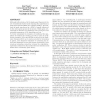529 search results - page 53 / 106 » A framework for the description of evolutionary algorithms |
ATAL
2003
Springer
14 years 27 days ago
2003
Springer
Although well understood in the single-agent framework, the use of traditional reinforcement learning (RL) algorithms in multi-agent systems (MAS) is not always justified. The fe...
CEC
2007
IEEE
13 years 11 months ago
2007
IEEE
This article, which lies within the data mining framework, proposes a method to build classifiers based on the evolution of rules. The method, named REC (Rule Evolution for Classif...
KDD
2004
ACM
14 years 8 months ago
2004
ACM
Traditional clustering is a descriptive task that seeks to identify homogeneous groups of objects based on the values of their attributes. While domain knowledge is always the bes...
IPPS
2008
IEEE
14 years 2 months ago
2008
IEEE
We introduce a generic framework for the distributed execution of combinatorial optimization tasks. Instead of relying on custom hardware (like dedicated parallel machines or clus...
WECWIS
2006
IEEE
14 years 1 months ago
2006
IEEE
This paper describes a software solution for the WSChallenge 2006. We introduce the MOVE framework that has been applied to this challenge. Also, the architecture, algorithms, and...

